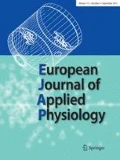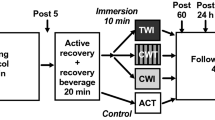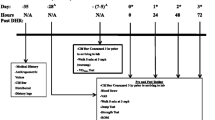Abstract
Purpose
The purpose of this double-blind, placebo-controlled study was to examine the effect of two fish oil supplements, one high in EPA (750 mg EPA, 50 mg DHA) and one low in EPA (150 mg EPA, 100 mg DHA), taken acutely as a recovery strategy following EIMD.
Methods
Twenty-seven physically active males (26 ± 4 year, 1.77 ± 0.07 m, 80 ± 10 kg) completed 100 plyometric drop jumps to induce muscle damage. Perceptual (perceived soreness) and functional (isokinetic muscle strength at 60° and 180° s−1, squat jump performance and countermovement jump performance) indices of EIMD were recorded before, and 1, 24, 48, 72, and 96h after the damaging protocol. Immediately after the damaging protocol, volunteers ingested either a placebo (Con), a low-EPA fish oil (Low EPA) or a high-EPA fish oil (High EPA) at a dose of 1 g per 10 kg body mass.
Results
A significant group main effect was observed for squat jump, with the High EPA group performing better than Con and Low EPA groups (average performance decrement, 2.1, 8.3 and 9.8%, respectively), and similar findings were observed for countermovement jump performance, (average performance decrement, 1.7, 6.8 and 6.8%, respectively, p = 0.07). Significant time, but no interaction main effects were observed for all functional and perceptual indices measured, although large effect sizes demonstrate a possible ameliorating effect of high dose of EPA fish supplementation (effect sizes ≥0.14).
Conclusion
This study indicates that an acute dose of high-EPA fish oil may ameliorate the functional changes following EIMD.



Similar content being viewed by others
Abbreviations
- CK:
-
Creatine kinase
- CMJ:
-
Countermovement jump
- DHA:
-
Docosahexaenoic acid
- EIMD:
-
Exercise-induced muscle damage
- EPA:
-
Eicosapentaenoic acid
- IL-6:
-
Interleukin-6
- SJ:
-
Squat jump
References
Ali A, Creasy R, Edge J (2011) The effect of graduated compression stockings on running performance. J Strength Cond Res 25:1385–1392
American College of Sports Medicine (2013) ACSM’s Guidelines for Exercise Testing and Prescription, 9th edn. Lippincott, Williams & Wilkins, Philadelphia, PA
Bailey D, Erith S, Griffin P, Dowson A, Brewer D, Gant N, Williams C (2007) Influence of cold-water immersion on indices of muscle damage following prolonged intermittent shuttle running. J Sports Sci 25:1163–1170
Barnett A (2006) Using recovery modalities between training sessions in elite athletes. Sports Med 36:781–796
Bourgeois J, MacDougall D, MacDonald J, Tarnopolsky M (1999) Naproxen does not alter indices of muscle damage in resistance-exercise trained men. Med Sci Sports Exerc 31:4–9
Burt D, Twist C (2011) The effects of exercise-induced muscle damage on cycling time-trial performance. J Strength Cond Res 25:2185–2192
Burt D, Lamb K, Nicholas C, Twist C (2013) Effects of repeated bouts of squatting exercise on sub-maximal endurance running performance. Eur J Appl Physiol 113:285–293
Byrne C, Eston R (2002) The effect of exercise-induced muscle damage on isometric and dynamic knee extensor strength and vertical jump performance. J Sports Sci 20:417–425
Cohen J (1988) Statistical power analysis for the behavioural sciences (2nd Ed.) Laurence Erlbaum Associates, USA
Gingras A-A, White P, Chouinard P, Julien P, Davis T, Dombrowski L, Couture Y, Dubreuil P, Myre A, Bergeron K, Marette A, Thivierge M (2007) Long-chain omega-3 fatty acids regulate bovine whole-body protein metabolism by promoting muscle insulin signaling to the Akt-mTOR-S6K1 pathway and insulin sensitivity. J Physiol 579:269–284
Highton J, Twist C, Eston R (2009) The effects of exercise-induced muscle damage on agility and sprint running performance. J Exerc Sci Fit 7:24–30
Hilbert J, Sforzo G, Swensen T (2003) The effects of massage on delayed onset muscle soreness. Br J Sports Med 37:72–75
Houghton D, Onambele G (2012) Can a standard dose of eicosapentaenoic acid (EPA) supplementation reduce the symptoms of delayed onset muscle soreness? J Int Soc Sports Nut 9:2
Hu F, Bronner L, Willett W, Stampfer M, Rexrode K, Albert C, Hunter D, Manson J (2002) Fish and Omega-3 fatty acid intake and risk of coronary heart disease in women. J American Medical Assoc 287:14
Jakeman J, Macrae R, Eston R (2009) A single 10-min bout of cold-water immersion therapy after strenuous plyometric exercise has no beneficial effect on recovery from the symptoms of exercise-induced muscle damage. Ergonomics 52:456–460
Jakeman J, Byrne C, Eston R (2010) Lower limb compression garment improves recovery from exercise-induced muscle damage in young, active females. Eur J Appl Physiol 109:1137–1144
Jouris K, McDaniel J, Weiss E (2011) The effect of omega-3 fatty acid supplementation on the inflammatory response to eccentric strength exercise. J Sports Sci Med 10:432–438
Lembke P, Capodice J, Hebert K, Swenson T (2014) Influence of omega-3 (N3) index on performance and wellbeing in young adults after heavy eccentric exercise. J Sports Sci Med 13:151–156
Lenn J, Uhl T, Mattacola C, Boissonneault G, Yates J, Ibrahim W, Bruckner G (2002) The effects of fish oil and isoflavones on delayed onset muscle soreness. Med Sci Sport Exerc 34:1605–1613.
LeStayo P, Woolf J, Lewek M, Snyder-Mackler L, Reich T, Lindstedt S (2003) Eccentric muscle contractions: their contribution to injury, prevention, rehabilitation and sport. J Orthop Sports Phys Ther 33:557–571
Lewis E, Radonic P, Wolever T, Wells G (2015) 21 days of mammalian omega-3 fatty acid supplementation improves aspects of neuromuscular function and performance in male athletes compared to olive oil placebo. J Int Soc Sports Nut 12:28
Margaritelis N, Theodorou A, Baltzopoulos V, Maganaris C, Paschalis V, Kyparos A, Nikolaides M (2015) Muscle damage and inflammation after eccentric exercise: can the repeated bout effect be removed? Phys Rep 3(12):e12648. doi:10.14814/phy2.12648
McBride J, McCaulley G, Cormie P (2008) influence of preactvitiy and eccentric muscle activity on concentric performance during vertical jumping. J Strength Cond Res 22:750–757
McHugh M (2003) Recent advances in the understanding of the repeated bout effect: the protective effect against muscle damage from a single bout of eccentric exercise. Scand J Med Sci Sports 13:88–97
Mickleborough T, Tecklenburg S, Montgomery G, Lindley M (2009) Eicosapentaenoic acid is more effective than docosahexaenoic acid in inhibiting proinflammatory mediator production and transcription from LPS-induced human asthmatic alveolar macrophage cells. Clin Nut 28:71–77.
Mickleborough T, Sinex J, Platt D, Chapman R, Hirt M (2015) The effects PCSO-524, a patented marine oil lipid and omega-3 PUFA blend derived from the New Zealand green lipped mussel (Perna canaliculus) on indirect markers of muscle damage and inflammation after muscle damaging exercise in untrained men: a randomized, placebo controlled trial. J Int Soc Sports Nut 12:10
Miller P, Bailey S, Barnes M, Derr S, Hall E (2004) The effects of protease supplementation on skeletal muscle function and DOMS following downhill running. J Sports Sci 22:365–372
Paoloni J, Milne C, Orchard J, Hamilton B (2009) Non-steroidal anti-inflammatory drugs in sport medicine: guidelines for practical but sensible use. Br J Sports Med 43:863–865
Pournot H, Bieuzen F, Duffield R, Lepretre P-M, Cozzolino C, Hausswirth C (2011) Short term effects of various water immersions on recovery from exhaustive intermittent exercise. Eur J Appl Physiol 111:1287–1295
Prasartwuth O, Taylor J, Gandevia S (2005) Maximal force, voluntary activation and muscle soreness after eccentric damage to human elbow flexor muscles. J Physiol 567:337–348
Proske U, Morgan D (2001) Muscle damage from eccentric exercise: mechanism, mechanical signs, adaptation and clinical applications. J Physiol 537:333–345
Rhea M (2004) Determining the magnitude of treatment effects in strength training research through the use of the effect size. J Strength Cond Res 18:918–920
Richardson J (2011) Eta squared and partial eta squared as measures of effect size in educational research. Ed Res Rev 6:135–147.
Smith G, Atherton P, Reeds D, Mohammed B, Rankin D, Rennie M, Mittendorfer B (2011a) Dietary omega-3 fatty acid supplementation increases the rate of muscle protein synthesis in older adults: a randomized controlled trial. American J Clin Nut 93:402–412
Smith G, Atherton P, Reeds D, Mohammed B, Rankin D, Rennie M, Mittendorfer B (2011b) Omega-3 polyunsaturated fatty acids augment the muscle protein anabolic response to hypoaminoacidemia-hyperinsulinemia in healthy young and middle aged men and women. Clin Sci 121:267–278
Tartibian B, Maleki B, Abbasi A (2009) The effects of ingestion of omega-3 fatty acids on perceived pain and external symptoms of delayed onset muscle soreness in untrained men. Clin J Sport Med 19:115–119
Tartibian B, Maleki B, Abbasi A (2011) Omega-3 fatty acids supplementation attenuates inflammatory markers after eccentric exercise in untrained men. Clin J. Sports Med 21:131–137
Tsuchiya Y, Yanagimoto K, Nakazato K, Hayamizu K, Ochi E (2016) Eicosapentaenoic and docosahexaenoic acids–rich fish oil supplementation attenuates strength loss and limited joint range of motion after eccentric contractions: a randomized, double–blind, placebo–controlled, parallel–group trial. Eur J Appl Physiol 116:1179–1188
Twist C, Eston R (2005) The effects of exercise-induced muscle damage on maximal intensity intermittent exercise performance. Eur J Appl Physiol 94:652–658
Warren G, Lowe D, Armstrong R (1999) Measurement tools used in the study of eccentric contraction-induced injury. Sports Med 27:43–59
Webb E, Willems M (2010) Effects of wearing graduated compression garment during eccentric exercise. Med Sport 14:193–198.
Weldon S, Mullen A, Loscher C, Hurley L, Roche H (2007) Docosehexaenoic acid induces an anti-inflammatory profile in lipopolysaccharide-stimulated human THP-1 macrophages more effectively than eicosapentaenoic acid. J Nut Biochem 18:250–258
Acknowledgements
We are grateful to Take Omega 3 for providing the fish oil and placebo supplementation.
Author information
Authors and Affiliations
Corresponding author
Ethics declarations
Conflict of interest
The authors note no conflict of interest.
Ethical approval
All procedures performed in studies involving human participants were in accordance with the ethical standards of the institutional and/or national research committee and with the 1964 Helsinki declaration and its later amendments or comparable ethical standards.
Additional information
Communicated by F. Fischetti.
Rights and permissions
About this article
Cite this article
Jakeman, J.R., Lambrick, D.M., Wooley, B. et al. Effect of an acute dose of omega-3 fish oil following exercise-induced muscle damage. Eur J Appl Physiol 117, 575–582 (2017). https://doi.org/10.1007/s00421-017-3543-y
Received:
Accepted:
Published:
Issue Date:
DOI: https://doi.org/10.1007/s00421-017-3543-y




